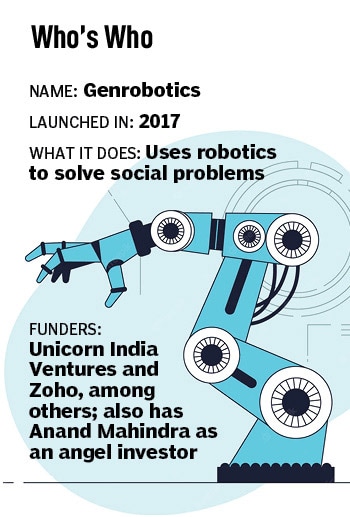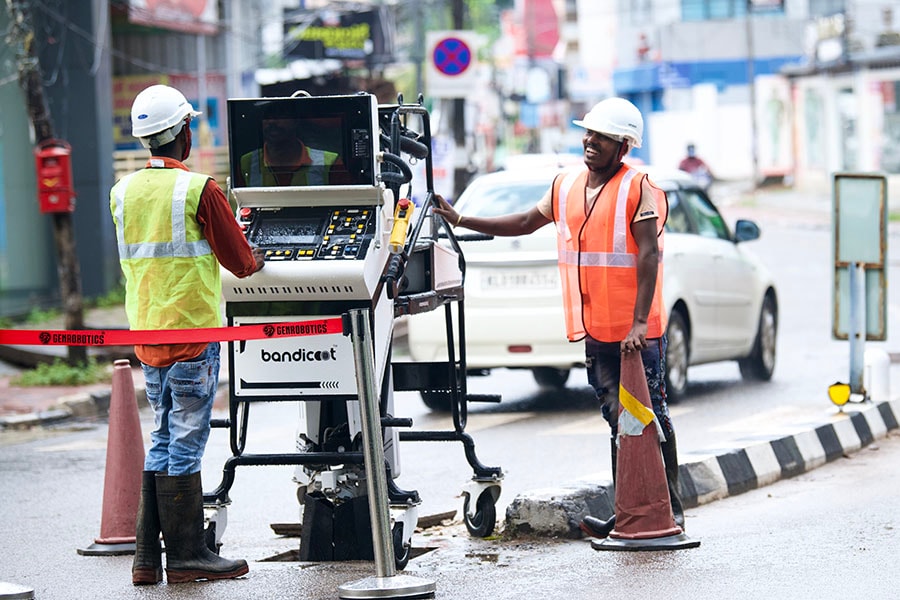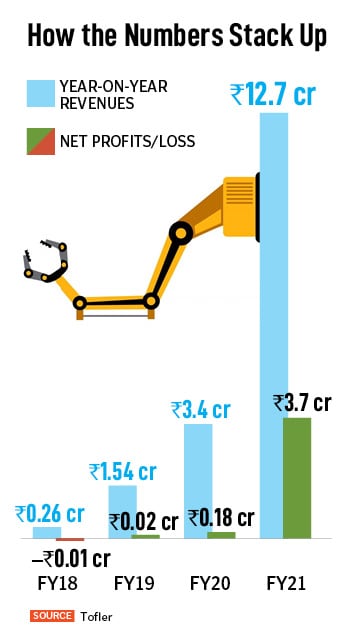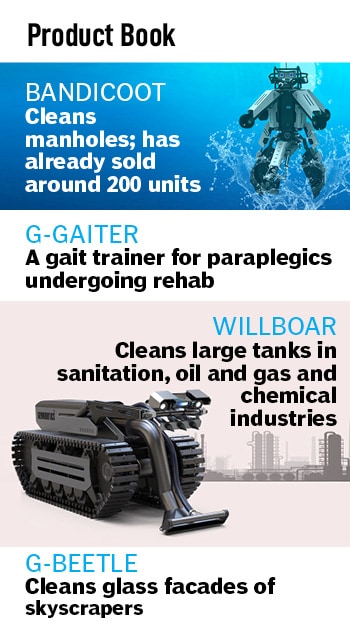Genrobotics: Scaling up while cleaning up
The Kerala-based robotics startup, which began with machines to clean sewers, is growing in size and scope while doing social good


Nearly two decades ago, as a sanitation worker for the Indore Municipal Corporation, Govind Bherve would routinely lower himself into manholes, and clean the sludge and muck out with his hands. Often, he’d say a silent prayer before jumping in, for he didn’t know if a reptile or a rodent would be lurking inside during work, he was dunked in filthy sewage water gushing out of the pipes. “We spent close to 30 minutes inside a manhole every day, and continued with our 8-10 hour shifts thereafter," says Bherve, now 35. “It was so dirty that I got skin infections regularly."
Even outside work hours, Bherve was called to attend emergencies, say, when a plumbing line choked at midnight. “We’d just take off our clothes and go into the manhole," he says. “Protective suits the, par usme dum ghut ta tha [there were protective suits, but they would suffocate us]."
Bherve still works as a sewage worker with the municipal corporation, but his life has taken a U-turn. For some time now, he hasn’t set foot inside a manhole instead he operates a robot that opens the manhole cover, goes deep into it and scoops out the sewage with its multi-functioning arm, just like a human. “There’s a screen attached to the external unit that shows us the nature of garbage inside, helping us manoeuvre the arm efficiently it also detects if there’s noxious gas inside," he says. “This robot has made our lives so much easier."
Christened Bandicoot, the robotic scavenger that has brought Bherve such joy is the brainchild of four engineers—Arun George, Nikhil NP, Rashid K, and Vimal Govind MK—from Kerala, who seeded the idea in 2015, while studying in MES College of Engineering, Kuttippuram, in Malappuram district.
It started with designing for the college project a first-generation powered exoskeleton, a wearable mobile machine called the Iron Man suit, that could lift weights and facilitate military supplies in remote areas a fine-tuned version the following year was put together to help amputees walk, and a paper on it won the best concept award at the International Conference on Mechatronics and Manufacturing held in Singapore.
Five years on, Genrobotics has supplied nearly 200 Bandicoot machines to 16 states and one Union Territory, playing its part in the fight to eliminate manual scavenging, an inherently casteist profession (with usually Dalits being assigned to it) that continues despite being outlawed by the government through the Employment of Manual Scavengers and Construction of Dry Latrines (Prohibition) Act, 1993, and Prohibition of Employment as Manual Scavengers and their Rehabilitation Act, 2013. The government recently mentioned in Parliament that while there were no deaths reported due to manual scavenging, a fact that many take with a pinch of salt, 161 people died in the last three years in accidents while cleaning sewers and septic tanks.
 While Genrobotics has been steadfast in their focus on social good, its financials have also chimed in, with revenues climbing from Rs 25.6 lakh in FY18 to Rs 12.73 crore in FY21, as per financials database Tofler. During this period, it has not only managed to wipe out a loss of Rs 1.71 lakh it incurred in FY18, the first year of operations, it ended FY21 with a profit of Rs 3.71 crore. The company has raised investments from venture capitalists (VCs) like Unicorn India Ventures and SaaS major Zoho, and also counts industrialist Anand Mahindra among its angel investors.
While Genrobotics has been steadfast in their focus on social good, its financials have also chimed in, with revenues climbing from Rs 25.6 lakh in FY18 to Rs 12.73 crore in FY21, as per financials database Tofler. During this period, it has not only managed to wipe out a loss of Rs 1.71 lakh it incurred in FY18, the first year of operations, it ended FY21 with a profit of Rs 3.71 crore. The company has raised investments from venture capitalists (VCs) like Unicorn India Ventures and SaaS major Zoho, and also counts industrialist Anand Mahindra among its angel investors.
“Our vision is to make Genrobotics a global brand focussing on solutions in the robotics sector," says Vimal Govind MK, one of the co-founders. “We want to build a brand over the long term for that we want to remain profitable, and all our financial planning is centred around that."
In a step towards self-reliance, both financially and operationally, Genrobotics is amping up its manufacturing capabilities: From working out of the KWA office in 2017-18, it now has a 12,000 sq ft production floor in Thiruvananthapuram, and another 7,000 sq ft in Palakkad, where they are also setting up a 20,000 sq ft workspace.
“Once we started deploying Bandicoot, we started getting a lot of offers, but didn’t have the bandwidth to handle those," says Arun George, another co-founder. “So, we decided to build production capabilities from where we could operate independently. If we outsourced, we wouldn’t have been able to control the lead time."
 A Bandicoot being deployed to clean up a manhole in Thiruvananthapuram
A Bandicoot being deployed to clean up a manhole in Thiruvananthapuram
With the first production facility set up in Thiruvananthapuram, Genrobotics started manufacturing two to three units of Bandicoot per month. Subsequently, the capacity has gone up 10x to 20 to 30 units a month. Besides, several upgrades appended to the machine—moving from aluminium to carbon fibre structures, thereby shaving off 10 kg, adding extra cameras, improving camera quality, developing a software platform to train operators in two to three days instead of the earlier one month—have elevated the Bandicoot to its 2.0 avatar.
“Once we became 2.0, we were scaling at 4x every year till Covid slowed us down a bit," says Vimal. “We finished FY22 with nearly Rs 20 crore, but have already matched half of those numbers in the first quarter of this fiscal."
The municipal commission of Ulhasnagar, a town in Maharashtra’s Thane district, acquired its first Bandicoot in August 2021, and is on course to deploy its second machine. “The robot can go into deeper levels that our previous machines couldn’t. It is portable, easy to operate and can clean six-seven manholes a day compared to three-four by the traditional machines," says Dr Raja Dayanidhi M, municipal commissioner, Ulhasnagar. “Our sanitation workers and citizens are extremely happy with its functioning and by next year, we plan to acquire two more so that the entire area under my purview can be cleaned with the Bandicoot."
But Genrobotics isn’t content with the tag of being a one-trick engineering marvel. The founders are building their R&D muscle not just to upgrade Bandicoot 1.0 to 2.0, but also diversify into products that operate on similar technological principles and hold a potential to transform society.
 It has rolled out two more products into the market: Willboar, to clean large tanks in sanitation, oil and gas and chemical industries, and G-Gaiter, a medical robotic gait trainer that helps paraplegics (who suffer from spinal cord injuries or medical conditions like strokes, cerebral palsy) undergoing neuro rehabilitation regain some of their limb movements. “The exoskeleton we built in college had multiple applications, especially in the medical industry. But it required a lot more R&D and funding than Bandicoot," says Vimal. “Once we started earning profits, we channelised those here."
It has rolled out two more products into the market: Willboar, to clean large tanks in sanitation, oil and gas and chemical industries, and G-Gaiter, a medical robotic gait trainer that helps paraplegics (who suffer from spinal cord injuries or medical conditions like strokes, cerebral palsy) undergoing neuro rehabilitation regain some of their limb movements. “The exoskeleton we built in college had multiple applications, especially in the medical industry. But it required a lot more R&D and funding than Bandicoot," says Vimal. “Once we started earning profits, we channelised those here."
The team spent the larger part of the two Covid years of slow business in researching the G-Gaiter, and commercialised it only in the last three months. “We haven’t marketed it well enough and have got a few purchase orders. We are building the bandwidth to meet supply demands of the future," says Vimal.
Revenues have started to trickle in from G-Gaiter as well as Willboar, the first unit of which was recently exported to Malaysia. Genrobotics has also struck up a dealership arrangement with NZ Softlets, a Malaysian software technology company that handles government projects in the sanitation sector.
When they launched Genrobotics, says Ashok Kurian Panjikaran, head, business development, startup lifecycle and IT, Kerala Startup Mission (one of Genrobotics’ early mentors), the founders were fresh out of college and didn’t know much about running a company. For example, restless in their early 20s, they would lose patience if the investors took time before writing their final cheques. “But they learnt from experience. Where they failed, they took learnings from those experiences," says Panjikaran. “They have excellent technical knowhow that will help them scale up."
In order to augment the latest medical advancements, Genrobotics has set up an office in the UK, where it works with the Cardiff Medicentre, a joint venture between Cardiff University and Cardiff and Vale University Health Board, which supports biotech and medtech startups, to improve the G-Gaiter. Besides, the company has revived work on a fourth product—G-Beetle, a device to clean glass facades of skyscrapers, after it was shelved during the Covid years to save costs.
“The great thing about Genrobotics is that the founders keep on learning from the market," says Anil Joshi, founder and managing partner of Unicorn India Ventures, which has invested close to half a million dollars in the company in two tranches. “Typically, you see companies that sell what they have developed. But here, the founders developed what the market needed. Besides, we read a lot about big corporates spending on R&D, but this is a startup which makes a lot of investments into R&D. It makes them unique."
 Of its 200-odd staff, up from the nine they started with, Genrobotics has deployed about one-fifth towards R&D, a function that has impressed Zoho, which recently invested Rs 20 crore in the company. CEO and co-founder Sridhar Vembu told Forbes India in an email: “It is important to have technological knowhow and capabilities if we have to make India globally competitive. We ourselves have built our technology through relentless focus on R&D over the past 26 years. We see that in Genrobotics as well. Besides, one of our core values is to serve the underserved we share that with Genrobotics as they are on a mission to eradicate manual scavenging."
Of its 200-odd staff, up from the nine they started with, Genrobotics has deployed about one-fifth towards R&D, a function that has impressed Zoho, which recently invested Rs 20 crore in the company. CEO and co-founder Sridhar Vembu told Forbes India in an email: “It is important to have technological knowhow and capabilities if we have to make India globally competitive. We ourselves have built our technology through relentless focus on R&D over the past 26 years. We see that in Genrobotics as well. Besides, one of our core values is to serve the underserved we share that with Genrobotics as they are on a mission to eradicate manual scavenging."
Arun says the success of Bandicoot gave them the confidence to apply its principles to other areas of robotics as well. “When we developed our first product, we weren’t confident that we could do it again. Our second milestone was to build another product and make the same journey of Bandicoot," he says. G-Gaiter ticked that box. “The ability to build that has helped us complete Willboar. Now we feel we can build solutions for any kind of problem."
“This may not be one of your sexy companies," says Joshi of Unicorn. “But the founders have built a classy product, and have also cracked the code of working with government bodies. I feel this is probably one company from our portfolio which can go to IPO."
For Genrobotics, solving the problem isn’t only limited to their products but going the whole hog, like enforcing a cultural change for sewage cleaners, who are conditioned to go into manholes, despite alternatives. “Because it’s something they have been doing for years, across generations," says Arun. The company has established the not-for-profit Genrobotics Foundation to address those problems, create awareness and facilitate a seamless migration from manual to robotic scavenging.
“Our vision is to build products for people who work in extreme and unsafe conditions, and give them dignity," says Vimal. “And we want to build a brand for the long term. We want to be to robotics what Apple and Samsung are to mobile phones."
First Published: Jun 21, 2022, 11:13
Subscribe Now